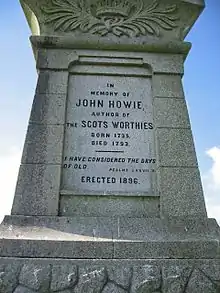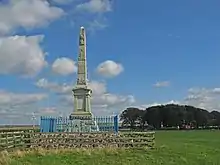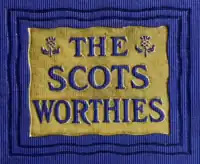John Howie | |
|---|---|
 obelisk in memory of Howie | |
| Born | 14 November 1735 Lochgoin |
| Died | 5 January 1793 (aged 57) |
| Occupation | farmer |
| Nationality | Scottish |
John Howie (14 November 1735 – 5 January 1793) was a Scottish biographer.[1][2][3] His best known work was Biographia Scoticana, first published in 1775, which is often called The Scots Worthies. It deals with Christians and particularly Presbyterians especially in their strivings with church and civil authorities.
Life
John Howie was an East Renfrewshire farmer from Lochgoin, who claimed descent from an Albigensian refugee.[1] The author was the 28th descendant in a direct line, all of whom were called John.[4] Although he was a plain unlettered peasant, cultivating the same farm which his ancestors had occupied for ages, a natural predilection for literary pursuits induced him to take up the task of recording the lives of the martyrs and confessors of Scotland.[5] His family home at Lochgoin Farm was a noted refuge for Covenanters, and was subject to several searches by government soldiers. The farmhouse was rebuilt in the 18th century, with the date 1187 on a lintel marking when the Howies first settled there. Several relics were kept in what has become a small museum, and in 1896 a stone obelisk was erected nearby as a monument "in memory of John Howie, author of the Scots Worthies". It now lies within the area of Whitelee Wind Farm and has track access from the visitor centre.[6]

Works
Howie wrote Lives of the Protestant worthies of Scotland from Patrick Hamilton, the first martyr, under the title of Biographia Scoticana, first published in 1775. It became a classic of Scottish Church History and was often called The Scots Worthies. He revised and enlarged the work, 1781–5, and this edition was reissued, with notes by William McGavin, in 1827. In 1870 the Rev. William Henderson Carslaw revised Howie's text and published it, with illustrations and notes, and a short biographical introduction; and in 1876 a further illustrated edition appeared, with biographical notice compiled from statements made by Howie's relatives, and an introductory essay by Dr. Robert Buchanan.[1]
A Collection of Lectures and Sermons by Covenanting Clergymen was issued by Howie in 1779, with an introduction by himself. He edited in 1780 Michael Shields's Faithful Contendings Display'd, an account of the Church of Scotland between 1681 and 1691.[7] He also wrote on the Lord's Supper, patronage, and other topics, and prefaced and annotated other religious works.[1]
The Lives in Biographia Scoticana (2nd edition)



The list below reflects the chapter order in the book. For an alphabetical list see the "Scots Worthies" template at the foot of the page.
- Patrick Hamilton
- George Wishart
- Walter Mill
- James Stuart, Earl of Moray
- John Knox
- George Buchanan
- Robert Rollock
- John Craig
- David Black
- John Davidson
- William Row
- Andrew Melville
- Patrick Simpson
- Andrew Duncan
- John Scrimgeour
- John Welch
- Robert Boyd
- Robert Bruce
- Josias Welch
- John Gordon, Viscount Kenmuir
- Robert Cunningham
- Alexander Henderson
- George Gillespie
- John M'Clellan
- David Calderwood
- Hugh Binning
- Andrew Gray
- James Durham
- Samuel Rutherford
- Archibald Campbell, Marquis of Argyle
- James Guthrie
- John Campbell, Earl of Loudon
- Robert Baillie
- David Dickson
- Archibald Johnston, Lord Warriston
- James Wood
- William Guthrie
- Hugh Mackail
- John Nevay
- John Livingston
- John Semple
- James Mitchell
- William Gordon of Earlston
- John Kid
- John King
- John Brown of Wamphray
- Henry Hall of Haughhead
- Richard Cameron
- David Hackston of Rathillet
- Robert Ker of Kersland
- Donald Cargill
- Robert Garnock
- Robert M'Ward
- John Paton
- John Nisbet of Hardhill
- Alexander Peden
- John Blackadder
- James Renwick
- Alexander Moncrieff
- Angus MacBean
- Thomas Hog
- Robert Fleming
- Alexander Shields
- John Dickson
- Sir Robert Hamilton of Preston
- William Veitch
- John Balfour of Kinloch
- Robert Traill, father
- Robert Traill, and son[9]
See also
References
Citations
- 1 2 3 4 Bayne, Thomas Wilson (1891). "Howie, John". In Lee, Sidney (ed.). Dictionary of National Biography. Vol. 28. London: Smith, Elder & Co.
- ↑ Couper, W. J. (1938). John Howie of Lochgoin and Fenwick. Edinburgh: Scottish Church History Society.
- ↑ Du Toit, Alexander (2004). "Howie, John". Oxford Dictionary of National Biography (online ed.). Oxford University Press. doi:10.1093/ref:odnb/13992. (Subscription or UK public library membership required.)
- ↑ Fleming, David Hay (1903). "John Howie of Lochgoin". The Princeton Theological Review. Philadelphia: MacCalla & Co. Inc. 7 (1): 1-28.
- ↑ Irving, Joseph (1881). The book of Scotsmen eminent for achievements in arms and arts, church and state, law, legislation, and literature, commerce, science, travel, and philanthropy. Paisley: A. Gardner.
 This article incorporates text from this source, which is in the public domain.
This article incorporates text from this source, which is in the public domain. - ↑ "Lochgoin Farmhouse And Monument To John Howie". Canmore. 23 August 1956. Retrieved 27 November 2016.
- ↑ Shields & Guthrie 1780.
- ↑ Du Toit 2004.
- ↑ Howie, John (1870). Carslaw, W. H. (ed.). The Scots worthies. Edinburgh: Oliphant, Anderson, & Ferrier.
Sources
- Fleming, David Hay (1909). John Howie of Lochgoin : his forebears and his works (Reprinted from the Princeton Theological Review, vol. VII, no. 1, Jan. 1909 ed.). New Jersey: Princeton.
- Shields, Michael; Guthrie, James (1780). Faithful contendings displayed : being an historical relation of the state and actings of the suffering remnant in the church of Scotland, who subsisted in select societies, and were united in general correspondencies during the hottest time of the late persecution, viz. from the year 1681 to 1691... Glasgow: Printed by John Bryce.
Attribution
 This article incorporates text from a publication now in the public domain: Cousin, John William (1910). A Short Biographical Dictionary of English Literature. London: J. M. Dent & Sons – via Wikisource.
This article incorporates text from a publication now in the public domain: Cousin, John William (1910). A Short Biographical Dictionary of English Literature. London: J. M. Dent & Sons – via Wikisource.
 This article incorporates text from a publication now in the public domain: Lee, Sidney, ed. (1891). "Howie, John". Dictionary of National Biography. Vol. 28. London: Smith, Elder & Co.
This article incorporates text from a publication now in the public domain: Lee, Sidney, ed. (1891). "Howie, John". Dictionary of National Biography. Vol. 28. London: Smith, Elder & Co.
